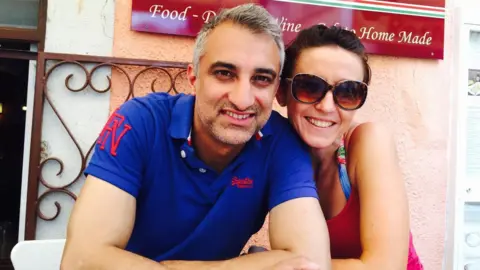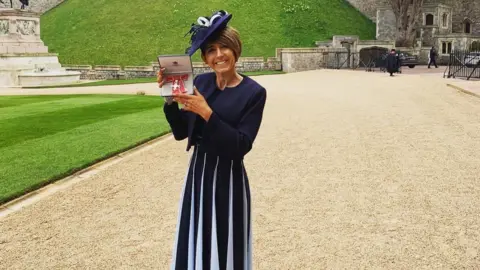Rule change on open prisons leaves victim in fear
A woman stabbed 24 times by her ex-partner while eight months pregnant says she is living in fear after learning he will be eligible for open prison years earlier than she expected.
In June 2016, Babur Raja was given an 18-year sentence for the attempted murder of Natalie Queiroz, having attacked her on a Sutton Coldfield street months before.
She has since tried to pick up the pieces of her life, drawing some comfort from his being behind bars.
But the government has confirmed to the BBC a rule change that means Raja's eligibility to serve the rest of his sentence in open prison kicks in this year, rather than 2029 as his victim once thought. And that, she says, "make me physically ill".
"The thought that somebody who [tried to] murder you and your child could be outside, even on day release, four years earlier than I was expecting - my fear of risk to me, to my child, to my other two children is now huge," the 49-year-old said.
Open prisons have minimal security and allow eligible prisoners to spend most of their day away from the site on licence to carry out work, education or for other resettlement purposes.
The rule change does not apply to offenders serving life sentences or public protection sentences, but does cover those serving extended determinate sentences like Raja.
Previously, rules stated the eligibility of such inmates for open prison could only come within three years of their eligibility for parole, but also no earlier than five years before their automatic release date.
The five years component, though, was dropped in March last year, the Ministry of Justice (MoJ) has confirmed to the BBC.
In the case of Raja, whose automatic release date is 2034, his parole eligibility is set for 12 years into his sentence, ie 2028. Therefore, under the rule change, his eligibility for open prison is as soon as 2025, rather than 2029 as it would have been previously.
An MoJ spokesperson said: "Eligible offenders are subject to a thorough risk assessment before they can be moved to an open prison and anyone found breaching the rules can be immediately returned."
 Natalie Queiroz
Natalie QueirozThe MoJ added that open prison provided opportunity for offenders to prepare within prison for their release, including finding a job and re-establishing relationships, both of which it said were proven to significantly reduce the chance of re-offending.
It said the rule change also allowed prisoners who had spent longer in custody to be tested in open prisons, and ensured the prison service was making efficient use of space across the prison estate.
Ms Queiroz, made an MBE for services to young people since the attack, said she only learned about the change through an ad-hoc conversation during outreach work in a prison, later passing on the information to the BBC.
She said that while she understood the broad rationale behind the switch, there should be automatic exclusions as was the case with other measures brought in to relieve prison pressures. Offenders in cases like hers must be ineligible, she stated.
That was because the victims, she said, had been deliberately singled out by the perpetrators.
 Natalie Queiroz
Natalie Queiroz"It can't be stated whether that offender has really moved on mentally in the time that they've been in the prison system," Ms Queiroz said.
"That's really where my issue is, where there's a targeted victim."
In the attack she suffered knife wounds to her heart, lung, liver and uterus, plus deep cuts to her wrists.
She later had one finger amputated due to complications.
The daughter Ms Queiroz was carrying at the time survived. Raja's convictions included attempted child destruction.
 Natalie Queiroz
Natalie QueirozThe Prison Reform Trust has backed the MoJ's move.
Its chief executive Pia Sinha said: "Open prisons play a crucial role in rehabilitation and resettlement, allowing individuals to demonstrate progress and reduced risk before release.
"These changes ensure transfer decisions are based on individual risk assessments, not just sentence length, meaning those who would benefit most from open conditions can access them - lowering their risk of re-offending while preparing for release."
'Just awful'
Ms Queiroz told the BBC she remained worried about freedoms that could soon be afforded to her ex-partner.
She said her family were very careful about what they shared on social media, but she was concerned he may be able to access information while on day release that would otherwise be off-limits to him in prison.
She said: "As a victim of such a violent unforeseen crime, it's just awful because nobody can say to me 'we can risk assess him and say that he won't do it', because nobody foresaw what he was going to do."
Claire Waxman, Victims Commissioner for London, said she believed victims should be told about the rule change.
She said: "Now that we know this [change] did happen last March, I'm really urging the Ministry of Justice to communicate it far better, and ensure those victims impacted understand it as well; what it means for them.
"In Natalie's case, and in other cases where there is domestic abuse or potential ongoing risk, we really need to consider these cases very carefully."
Follow BBC Birmingham on BBC Sounds, Facebook, X and Instagram.
